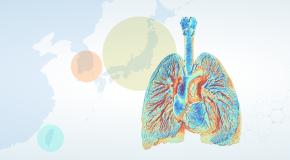Lung cancer is the most fatal cancer worldwide. By 2050 the global burden of lung cancer is projected to increase to 3.8m new cases and 3.2m deaths per year, with the greatest burden expected in East Asia, at 1.7m new cases and 1.5m deaths.1
The Economist Impact report, "Breathing in a new era: a comparative analysis of lung cancer policies in Japan, South Korea and Taiwan," sponsored by MSD, evaluates the various policies impacting lung cancer care in the three countries under the following five domains:
- Lung cancer is a strategic priority: focusing on national cancer control plans and clinical guidelines
- Lung cancer is a public health issue: covering health literacy, tobacco control and screening
- Lung cancer is a race against time: reviewing rapid referral pathways and fast-track referral processes to diagnosis and treatment
- Lung cancer is at a crossroads: assessing effective treatment and quality care
- Lung cancer is a focus for research: appraising cancer registries and research and development initiatives
The report uncovers the advancements in lung cancer care and policy changes in Japan, South Korea and Taiwan since our last report and identifies areas for further growth. We have identified the following four calls to action for these countries to improve lung cancer care and patient outcomes:
- Improve tobacco control and air quality management
- Identify the truly high-risk population for targeted screening
- Bridge inequities and improve access to comprehensive care
- Advance translational research in lung cancer among never-smokers
References
1 Sharma R. Mapping of global, regional and national incidence, mortality and mortality-to-incidence ratio of lung cancer in 2020 and 2050. Int J Clin Oncol. 2022 Apr;27(4):665-675. doi: 10.1007/s10147-021-02108-2. Epub 2022 Jan 12. PMID: 35020103; PMCID: PMC8753949.






